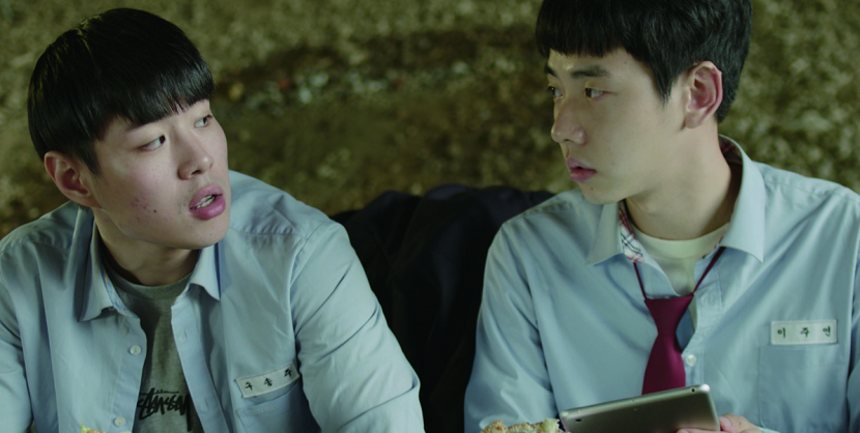Busan 2020 Review: LIMECRIME, Tone Deaf Hip-hop Biopic

As a self-confessed Korean hip-hop ‘stan’, Limecrime is a dismal disappointment. This is Directed by the actual former Limecrime duo LEE Seunghwan and YOO Jaewook, who moved on from performing together in the early aughts and are no longer part of the scene, and unfortunately with this feature it really shows. Clocking in at just under ninety minutes so little actually occurs that the film feels double this length.
Although it is based on true events, the timeline is completely scrambled; with modern day references aplenty despite the early to mid 2000s setting which is the vibe it tries and fails to emulate. The gonzo street style camera work is endearing, but nothing is cohesive, viewers are initially thrown into scenes with no rhyme or reason, bungled by poor choices and pacing; this is not a remix or a cool effect, it is just bad editing.
Limecrime attempts a class-based narrative; Songju, who is poor and failing school and Juyeon, wealthy and exemplary, are classmates brought together purely for their love of Hip-hop. Meandering scenes of them hanging out, their home life and the various friends and foes are background noise to the main narrative. Limecrime is in fact a coming-of-age story, with a dash of incomplete rap bars scattered throughout. The music should be the main event, the production value of this film should focus on making these moments of pure rap the standout, instead they feel as pedestrian as everything else that does not work here.
The insincere drama Limecrime does generate revolves mainly around petty crime and distant parents, passing observations in mostly boring scenes of stilted aimlessness and rough acting. There are certainly moments to appreciate, like the dynamic lyrics presented on-screen that convey the legitimate talent of these would-be rappers, but again these are literally incomplete segments.
It is an odd feeling that this generation can be nostalgic over perceived old school things such as CD’s and Mp3’s. It is a kind of funny element in Limecrime, but has nothing to do with the plot, personal boredom led to that observation. There are also a few fun albeit brief cameos from legends of the Korean Hip-hop scene (legends in the early 2000s anyway) as well as insider jokes, jabs and disses. However a niche level of understanding is required to appreciate that layer. Another point is the actual lack of music throughout, relying on generic free-license beats, which proves hilariously awkward when the film that is paying homage to its inspirations cannot afford the rights to play the Wu-Tang Clan.
There are some interesting creative clashes between the duo, and if Limecrime relied more on presenting the creative process of producing this music, even with its limited budget it would be far more compelling. It does to an extent ascertain their strengths, weaknesses and how they gel as a duo, but again is too unfocused. Instead what we get is melodrama via petty crime and indecision, as well as whiplash from the make up and break up nature of their working relationship.
This culminates in a briefly feel good ending, that shows how both came together and drifted apart, ultimately as it was in their real life. Limecrime is certainly watchable but deeply unexciting or inspiring. For your K-hip hop fix, stick to Show Me The Money.







